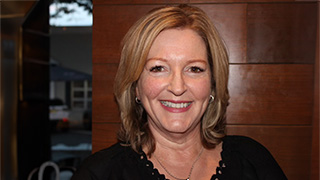Mental Health Advocate Leads In-Demand M.S.N. Program
Wednesday, August 28, 2024

Program Director Kate Tarpey Balsamo leads the College’s Psychiatric-Mental Health Nurse Practitioner program.
This fall, the College of Nursing proudly welcomes Kate Tarpey Balsamo, M.S.N., A.P.N., P.M.H.N.P-B.C., C.P.N.P.-P.C., as the new program director of Seton Hall’s M.S.N. in Psychiatric-Mental Health Nurse Practitioner (P.M.H.N.P.) program. Balsamo earned a B.S.N. and later an M.S.N. in Maternal Child Health. Over more than two decades, she became an accomplished practitioner in diverse settings, including the PICU, primary care and urgent care. Balsamo joined Seton Hall as the College of Nursing’s Clinical Placement Coordinator while pursuing a post-master’s certificate in Psychiatric-Mental Health — the program she now leads. She is certified as a Psychiatric Mental Health Nurse Practitioner by ANCC and AANPCB, in addition to her Pediatric certification.
As she steps into her new leadership role, Balsamo shares her insights on the importance of mental health education and why future nurse practitioners should consider this in-demand field.
What sparked your interest in the field of mental health?
My interest has been long-standing. In every area of my nursing career, I have recognized the impact that mental health has on our overall physical well-being. Mental health is often overlooked and not fully understood, and I felt a calling to provide more well-rounded care to patients. That is why I am honored and so excited to be part of Seton Hall’s M.S.N. in P.M.H.N.P. program.
Why should future nurse practitioners consider the M.S.N. in Psychiatric-Mental Health specialization?
It’s become increasingly clear that there is a shortage of qualified practitioners with psychiatric-mental health training in the United States. At Seton Hall, we are aiming to fill that gap. Our program equips a new generation with the skills to provide comprehensive and collaborative patient care in a variety of inpatient and outpatient settings. Our graduates are in-demand, and qualified to lead with empathy and expertise in a range of settings.
How would you describe the program? What sets it apart?
Our program combines the best of both worlds: the flexibility of 100% online classes with in-person clinical training. The curriculum emphasizes the importance of assessment, pharmacology, diagnosis and psychiatric interventions. The clinical experience is supported by Seton Hall’s extensive clinical network – our dedicated staff places students in a variety of settings to complete 600 hours of training required for the degree.
Where have recent students done their clinical training?
At hospitals such as Morristown Medical Center and Newark Beth Israel Medical Center, and at nationally recognized rehabilitation centers such as Newark’s Broadway House for Continuing Care. Students who live outside of New Jersey may be able to complete their clinical hours within their home state, depending on regional regulations.
What are some of the settings where graduates can work?
Psychiatric-mental health nurse practitioners have a wide range of career options and are especially well-suited to working with underserved populations in clinics, community centers, the criminal justice system, schools and hospitals.
How can potential candidates learn more?
Additional program details are on our website. We also encourage interested candidates
to attend a virtual information session or schedule an individual conversation with
Director of Graduate Admissions and Compliance Gabby Zengewald at gabriele.zengewald@shu.edu.
Categories: Education, Health and Medicine





